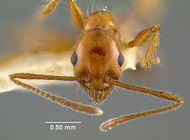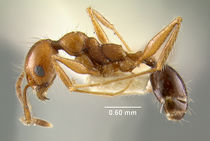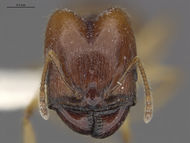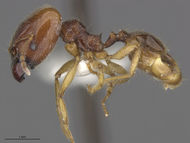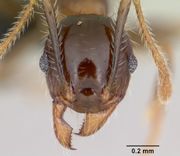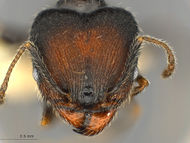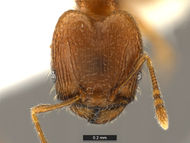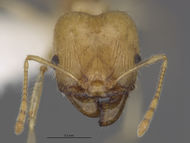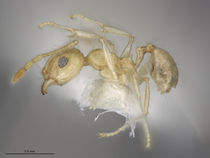Key to Pheidole of Hispaniola
Additional information about the ants of the island can be found here: Ants of Hispaniola
This key is a work in progress. If there are any errors, please fix them or let me know there is a problem (email: "dlubertazzi "at" oeb.harvard.edu") so I can edit and correct the problem.
This key requires both major and minor workers. For some species the characters used to separate species are either variable or based on few examples, e.g., only known from types. It may be that some of the characters used in the key don't apply across the full range of variability for any given species. This will only be revealed through the collection of additional material, and our having a better understanding of intraspecific variability.
Pheidole darlingtoni is known only from minors collected from the Massif de la Hotte in Haiti and is not included in this key. Pheidole darlingtoni is distinguished by its unique coloration (relative to other Hispaniola congeners), moderate-sized propodeal spines, and mostly foveolate head and mesosom. The minor is bicolored; mostly pale, whitish yellow, with light brown postpetiole, gaster, portions of head, and scapes.
Key to Workers
1
- Major head width greater than 1.2 mm; minor without foveae on pronotum and scape extends past occiput; larger majors and minors (one species, P. susannae, has majors with a head width ~ 1.2 mm; it is included in two places and will key out if followed from this or the next couplet) . . . . . 2
- Major head width less than 1.2 mm; minor workers variable in features given above, may have no foveae on pronotum and scape may extend past occiput; smaller majors and minors . . . . . 6
2
return to couplet #1
- Major, in full face view, vertex of head not smooth and shiny . . . . . 3
- Major, in full face view, vertex of head mostly smooth and shiny . . . . . 4
3
return to couplet #2
- Major, in full face view, hairs along margin of sides and dorsum of head decumbent, most of head longitudinally rugose with much less pronounced sculpturing in interspaces. Minor, head in full face view, margin of head above eye to occiput carina without a strong angle between the sides and dorsum but margin sides and a dorsum evident . . . . . Pheidole indica
- Major, in full face view hairs along margin of sides and dorsum of head erect, most of head with lateral and longitudinal rugosity. Minor, head in full face view, margin of head above eye to occiput carina relatively evenly curved and without a distinctive side and dorsum . . . . . Pheidole jelskii
4
return to couplet #2
- Minor, antennal scape surpassing posterior lateral margin of head by close to or more than one half its total length . . . . . Pheidole susannae
- Minor, antennal scape surpassing posterior lateral margin of head by less than a third of total length . . . . . 5
5
return to couplet #4
- Major, in full face view, margin of sides of head from above to below eye relatively straight, margin of dorsum of head with high corners that drop towards the center to form a deep valley-like occipital cleft. Minor, in side view, with notably abundant erect hairs on dorsum from head to gaster; minor scape and funiculus with abundant erect hairs . . . . . Pheidole hispaniolae
- Major, in full face view, margin of sides of head above and below eye concave, margin of dorsum of head with cleft but not strongly pronounced into deep valley. Minor, in side view, with erect hairs present from head to gaster but unevenly abundant on different body parts, e.g., few erect hairs on propodeum and petiole . . . . . Pheidole megacephala
6
return to couplet #1
- In full face view, head of major bicolored with sharp contrast between dark and light coloration; spines of major and minor well developed . . . . . 7
- In full face view, any bicoloration of head of major relatively minor gradation of single color, spines may or may not be present in major and minor . . . . . 8
7
return to couplet #6
- In full face view head of major medium brown in center and dark brown on at least the occiput and clypeus. In side view: promesenotum of minor strongly convex; in side view spine of major and minor wide along much of its tapering length, in minor convex along anterior margin and convex along posterior margin, resembles a shark fin . . . . . Pheidole drepanon
- In full face view head of major brownish yellow with exception of medium brown area in and around clypeus and occiput. In side view the spine of the major and minor well developed but more or less tapering evenly down to a point from its base . . . . . Pheidole harlequina
8
return to couplet #6
- Entire dorsal and lateral areas of mesosoma of minor foveolate . . . . . 9 (jamaicensis, flavens and moerens)
- Mesosoma of minor with some areas, or entirely free of, foveolae . . . . . 11
9
return to couplet #8
- In major dorsal view, lateral margins of postpetiole taper to blunt points or spines. In major at least part of anterior half of median strip of first gastral tergite and in minor entire first gastral tergite shargreened and more opaque than rest of gaster; in lateral view basal face (dorsum) of propodeum in minor longer than declivious face, node of postpetiole much lower than node of petiole . . . . . Pheidole jamaicensis
- In dorsal view lateral margins of postpetiole of major not tapered into blunt points or spines. In minor lateral view basal and declivious face of propodeum in minor roughly similar in length, postpetiole with rounded dorsum (flavens, moerens - variable in their characters and even with a good sample of majors and minors may be difficult to make definitive determinations) . . . . . 10
10
return to couplet #9
- In dorsal view postpetiole of major subquadrate. Minor without or with a few carinulae present mesad to antennal fossa, to the frontal lobes and frontal triangle; in profile pronotum and mesonotum not as distinctly dome shaped relative to moerens, slightly flatter along dorsal margin . . . . . Pheidole flavens
- In dorsal view postpetiole of major elliptical. Minor with loose rugoreticulum present mesad to eye, with rugulae extending posterior to eye (easier to see on lighter colored individuals); in profile pronotum and mesonotum distinctly dome shaped; color varies from lighter yellowish red to dark brown/black; . . . . . Pheidole moerens
11
return to couplet #8
- Minor, antennal scape surpassing posterior lateral margin of head by close to or more than one half its total length . . . . . Pheidole susannae
- Minor, antennal scape surpassing posterior lateral margin of head, if at all, by less than a third of total length . . . . . 12
12
return to couplet #11
- In full face view head of major elongate; frontal lobes seen in side view of head triangular, propodeal spine small. In minor propdeal spine reduced to denticle, entire head and body smooth and shining . . . . . Pheidole subarmata
- Major and minor with propodeal spines; frontal lobes of major seen in side view of head not triangular . . . . . 13
13
return to couplet #12
- Major and minor with most of body dark brown . . . . . Pheidole sp1.
- Major and minor yellow . . . . . 14
14
return to couplet #13
- Major with well developed spine that is at least half as long as the basal face of the propodeum, in dorsal view postpetiole wider than broad but not drawn into strong ovoid shape, eye pear shaped and coming to a point that is directed to just behind the mandibles (ventral area of head) . . . . . Pheidole noar
- Major with spine that is roughly triangular, in dorsal view postpetiolar node subangulate, much broader than long . . . . . Pheidole terresi






